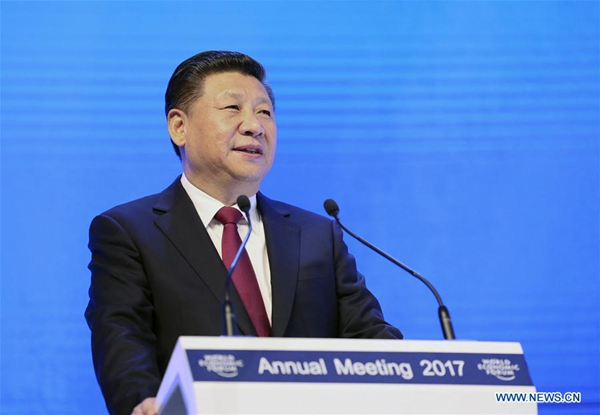Xi's WEF call for free trade
china.org.cn / chinagate.cn by Sajjad Malik, January 18, 2017 Adjust font size:
|
|
|
Chinese PresidentXi Jinping delivers a keynote speech at the opening plenary of the 2017 annual meeting of the World Economic Forum in Davos, Switzerland, Jan. 17, 2017. [Xinhua/Lan Hongguang] |
The annual World Economic Forum has started in Davos, Switzerland. It was inaugurated by President Xi Jinping. It is the first time in history that a Chinese president is taking part in the forum. The participation shows China's commitment to becoming part of the efforts to address the economic issues faced by the world.
The key highlight of the WEF this year is the keynote speech by President Xi, who talked about the economic challenges and offered his insights for addressing them. He defended globalization which has been threatened by the victory of Donald Trump, who is poised to take over the U.S. top office.
He said that globalization was like a big ocean and no one can escape it. So instead of avoiding the reality it would be better to be equipped and to swim across the mighty waves of the ocean. He also highlighted both positive and negative aspects of globalization, which offer big dividends if one is ready to climb up the steep hill.
Xi's words are a reassurance that globalization is here to stay and the frustration of the masses should not be with the system but with the factors which create hurdles in its smooth functioning.
The president also came down hard on protectionism which is increasingly popular after Brexit and the rise of Donald Trump. He said that protectionism is like shutting oneself in a dark room. It could be good solution to ward off rain and gusty winds but it will deprive the person inside the room from light and fresh air.
Xi's views are based on the experiences of China in steering the economic ship amidst difficulties. Recently, China has faced some problems like the slowing down of its growth rate and is trying to deal with it in its own way. The process of reform is already in progress and ultimately the growth will be adjusted accordingly.
He said that through hard work and sustained efforts, China had learnt to live and compete in the global economy. It was also a warning and lesson for others that in order to succeed, a lot of hard work isneeded.
Xi's spirited defense of globalization is support for the multi-stakeholders model also followed by the proponents of the WEF. Since China is the second biggest economy in the world, its support for the global economic regime is highly important for speeding up trade and reducing tariffs.
The president also talked about the issue of growth. He aptly pointed out that slow economic progress was due to a lack of robust drivers expediting the development. He highlighted the need of new models of global growth, which would play an important role along with multilateral and bilateral cooperation, as well as good economic governance and development to achieve the goal of a collective better tomorrow.
Xi also pointed out that uneven global development was an issue and urged for innovation driven progress which is based on win-win cooperation. He also called for an approach which should be inclusive, equitable and balanced.
Terming the WEF annual activity as Schwab Economic, Xi paid tribute to Professor Klaus Schwab, founder and executive chairman of the World Economic Forum. His brainchild has been at the forefront of providing a unique platform to political and economic leaders, policymakers, experts and critics to put together their heads for the collective economic welfare of everyone.
Xi's speech has set the tone for further discussion. In fact, his address and presence will help to augment the importance of the WEF, which is facing a test of its philosophy of free trade and unhindered economic activity. The address will also be remembered for generating hope in the time of increasing frustration with the prevailing economic order.
As pointed out at the forum, global disparities between the haves and the have-nots have reached a dangerous level and play an important role in the widening disenchantment with globalization. Most of the deprived people, both in the East and West, consider that the current system is heavily tilted in the favor of rich countries, rich groups, rich individuals and rich commercial entities.
President Xi assured the critics of the prevailing system that hard work and focused efforts can perform miracles. "We must remain committed to free trade and investment. We must promote trade and investment liberalization," he said.
Thus, his speech and presence adds a lot of value to WEF and its efforts towards a prosperous future for everyone, which should be based on cooperation and not confrontation. Xi's words that "No one will emerge as a winner in a trade war" will be echoed in Davos as participants debate the global economic challenges and opportunities.
Sajjad Malik is a columnist with China.org.cn. For more information please visit:
http://www.china.org.cn/opinion/SajjadMalik.htm
Opinion articles reflect the views of their authors, not necessarily those of China.org.cn.
